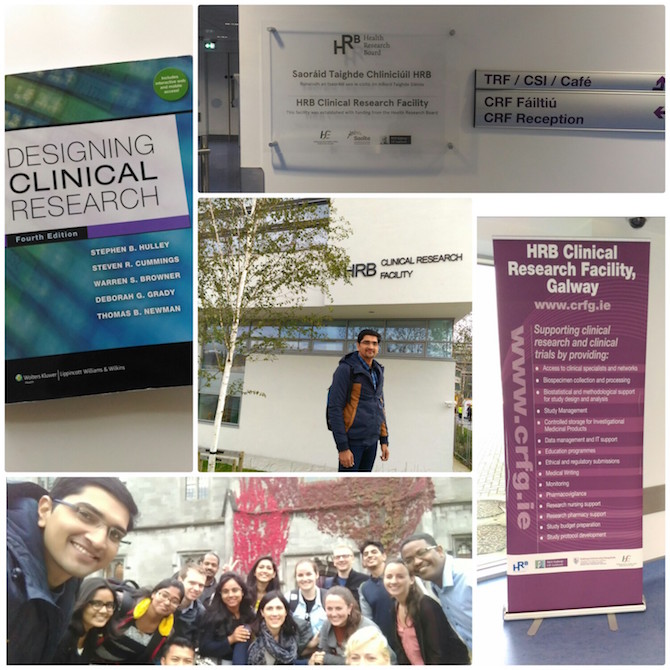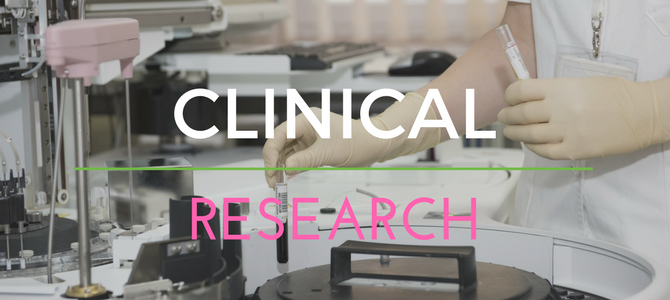Interested in a master’s in Clinical Research? Find out more about this one year, full-time course offered by the National University of Ireland Galway from international student, Shubham Atal…
 What is Clinical Research?
What is Clinical Research?
Clinical research is the branch of healthcare science that determines the safety and effectiveness (efficacy) of medications, devices, diagnostic products and treatment regimens intended for human use, through conduction of interventional and observational studies.
Is MSc Clinical Research at NUIG the course for me?
The course is for candidates who wish to move into professional roles in the domain of clinical research in industry or develop as researchers in academia. The course is delivered by the HRB Clinical Research Facility, Galway. The HRB-CRFG is a joint venture between the Health Research Board Ireland, the Saolta University Health Care Group and the National University of Ireland, Galway (NUIG). The course has a nicely structured curriculum and is the ideal duration of one year (full-time), which was a perfect fit for me when switching from an academic to a more clinical research oriented career. The format of compulsory and elective additional modules offers great flexibility.
How long has the course been running at NUIG and what makes it special?
The MSc Clinical Research was established in 2010 and till date has produced 49 graduates who have gone on to utilise their skills successfully in various domains of clinical research and healthcare. This was the first course of its type in Ireland and still remains one of the very few courses of its kind across Europe, with only a handful of universities in UK and a couple more in mainland Europe offering a one year training in clinical research for international students. It has acquired a national and international reputation with ever increasing numbers of applicants since its launch. There are 34 students currently registered, both full-time and part-time, to the programme from a variety of backgrounds.
Do I need experience?
The objective of the course is to provide education and training to a community of professionals who will enable to enhance Ireland’s reputation as an upcoming major player in the global clinical research scene. Developments are still ongoing in the field, but opportunities are opening up. It wouldn’t hurt if you had prior experience though, in terms of job opportunities in Ireland after a course like this.
Typical backgrounds from which students come in the course are: Medical/Surgical (50%), Biomedical science, Life Sciences, Pharmacy, Nursing, R&D (Industry), Healthcare, Education. Typical roles that graduates can go into after the course are: Clinical Principal Investigator, Trial Monitoring/Clinical Research Administration, Research Nursing, Research Pharmacy, Data Management, Quality and Regulatory affairs, Education, Pharmacovigilance, Project coordination/management.
What modules are covered?
Students are required to complete three compulsory modules and can choose from a basket of elective modules to make up a total of 90 ECTS credits including the 30 ECTS MSc thesis. The thesis is to be completed over the one year period and submitted at the end of the course. In choosing a thesis topic, interests of the students are taken into consideration, attempting to match them with supervisors in their choice of research areas.
The learning atmosphere is stimulating and encourages you to indulge in reading, learning, discussing, analysing the nuances of the field.
The modules covered in the course range from basics of medical research like fundamentals of health research, ethics, basic biostatistics to a wider spectrum of elective modules like advanced biostatistics, observational research methods, clinical trials, systematic reviews, translational medicine, clinical research administration, and even ‘wider perspective’ topics like economic evaluations, project management, database development. The first semester is mostly comprised of the three core modules, with choices of additional 2-3 modules available. So, in that sense, the second semester can be considered quite loaded with most elective modules to be chosen from and the thesis work expected to initialise.
How is the course structured in terms of learning and progression?
The course has a blended learning format wherein there are modules ‘taught’ conventionally, or ‘discussed’ or offered completely/partially in online mode. So, quite a bit of self-learning is expected, along with different kinds of assignments, which is a unique enriching experience in itself. It may require some ‘getting used to’ if you come from education systems based on didactic and proper classroom learning. The course is expected to move further towards an online delivery platform. The faculties involved in delivering the modules are very accomplished in their respective fields. Professor Martin O’Donnell, the program director, is a very well renowned figure in the field of vascular medicine and stroke.
What other benefits can I expect?
There are opportunities to participate in clinical research activities in the HRB-CRFG, gaining hands on experience and thereby providing students with greater opportunities in the future, having delved into the real-life setting of clinical research and associated activities. These opportunities come in form of part time paid internships / jobs and volunteer research assistantships. For the paid profiles, it is usually expected to have relevant prior work experience.
To sum up, this master’s program is a great platform if you are looking to launch or further your career in healthcare research in industry or academia. The learning atmosphere is stimulating and encourages you to indulge in reading, learning, discussing, analysing the nuances of the field. I would gladly recommend it to people who wish to explore opportunities to develop in clinical research in Ireland and globally.
More questions about MSc Clinical Research at NUIG? Comment below…
Interested in studying abroad? Visit the Education in Ireland website for more information


Hello Brother I have plans of taking up MSc in clinical research ,I completed my pharmD and looking for a master’s program . during my pharmD there are lot of topics covered in the course plan ,which are in the modules like ethics, biostatistics , clinical research etc..
My doubt is as pharmD is a 6 year course I have covered most of the modules that are present in the course plan (MSc in clinical research ) during my study ..
Do the modules cover the same syllabus or does it help me gain more advanced knowledge than what I learnt during my pharmD
Hello,
Very sorry for the late response. I have been caught up recently. Anyways, to address your query regarding the level of modules being offered in the MSc – I would say they range from basic to moderately advanced. It again depends on what modules you pick. Most of the core modules are basic. Some of the elective modules are more advanced.
Hope that answers some part of your query !
im looking for clinical research masters program with product development or mba or medical devices. Can you suggest universities which have the these programmes?